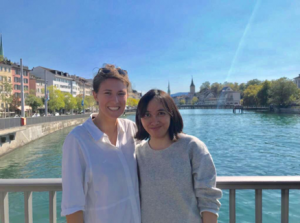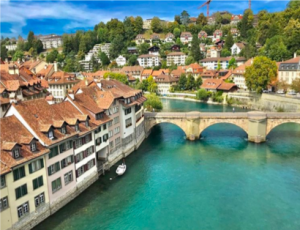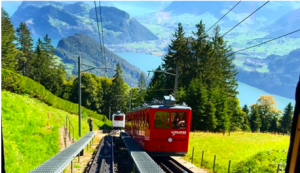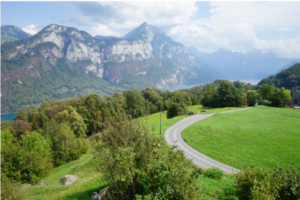
This post is written by Vicka Kharisma.
On September 2nd – 7th, 2018, I had an opportunity to join a summer school program organized by IDEA League – ETH-Zurich and was held at Seminar hotel Lihn in Filzhbach- Switzerland. This accommodation is located 75 km from Zurich, which was quite a location with a beautiful view of the lake and mountains that made all participants more focus and relax. During a week of the program, the host unUniversity provides good meals as wells. By reading all documents, I could get the overview of the summer school content and prepare some questions that I would like to ask during the program. This preparation helped me so much, so when I was in the class I could follow what the keynote speakers talking about.
Since this program was initiated by IDEA league, a consortium comprised TU Delft-ETH Zurich- RWTH Aachen – Chalmers University – Politenico di Milano, therefore most of the participants are the student from member European universities. Some students outside from IDEA league member list also participated in this program, such as Oxford University, Cornell University, Tokyo Institute of Technology, Hong Kong University of Science and Technology, Tsinghua University, Korea Advance Institute of Science and Technology, and Nanyang Technological University that made this program more diverse.
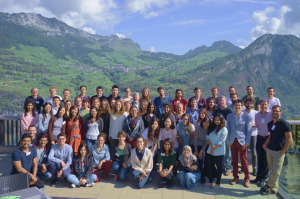
The program covers a series of topic related to environmental footprint topic such as measurement of environmental footprints, green economy initiatives, the relation between trade and the environment, changing paradigms of green business, and pro-environmental behavior. All the participants were divided into groups, and at the end of the program each group needs present their own group work.
Preparation before the Summer School
At first, I had interest in this summer school because by participating in this program will give me a valuable opportunity for making new networks with many scholars and broadening the horizon of my knowledge of environmental footprint from various disciplines primarily related to the strategies from all stakeholders for reducing the environmental burdens. In addition, the topic of this program is related to my current research interest which focusing on food, agriculture, and poverty issues. Since, food is also one of the significant environmental footprint drivers due to changes in the diet, growing population, global trades, and economic development. Therefore, the importance of food sustainability has become a critical issue in societies because the environment supports people` lives in providing food and is therefore vital for human well-being. After several steps of the screening process, I was selected as one of the students represent Tokyo Tech in that program.
Activities during the program
All participants were arrived 2nd of September and had dinner together at the seminar hotel Lihn. The class were started on September 3, and below is the program outline.
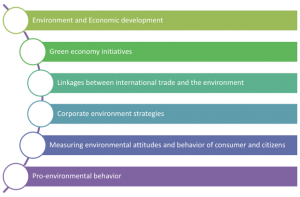
In the class, they encourage all participants to be actively answered and discuss some problems that given by each lecturer. I really enjoyed this session so much, because we were able to brainstorm our opinion and came up with some answers that based on each people background and knowledge. Sometimes we still continue to discussed and share our thoughts during lunch or coffee break. Moreover, in some sessions, I was be able to explain what is the current environmental policies situation both in Indonesia and Japan.
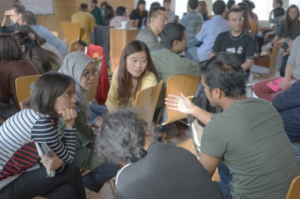
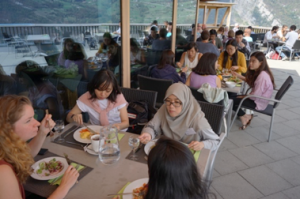
For the group project, each group should choose one interest case that has been provided by the program, and my group chooses a topic that related to NGO. In this project, we played the role as a politically active NGO based in a European country. Two of our organization’s most important goals are the reduction of poverty and at the same time environmental conservation. It is a priori unclear under what conditions these goals are substitutes or complements. Therefore, we were asked to develop a strategy for our organization that could make the two goals complementary. On the last day of the program, my group presented our project. We conclude that poverty alleviation and environmental conservation should not substitute each other but indeed should coexist. There are some pathways to alleviate the poverty issue such as rural electrification, food security, clean water, health and diseases, and education. Since people who live under the poverty in rural area are usually very dependent on natural resource in daily life, i.e. 50-89% of their income comes from nature ecosystem, therefore we proposed some strategies that can make both poverty alleviation and environmental conservation coexist especially in rural area cases, such as ownership and operation of natural resource by local community, a project that can allow those people get direct cash flow, and trained and encourage the poor to do a local green business entrepreneur. In order to attain the project goals, a quantitative indicator of poverty (e.g. income), and environmental condition (e.g Eco-footprint or level of indoor air pollution) measured before, during, and after project. The time frame of the project should clearly define in the beginning and external influences effect (e.g. a country economic or political condition) which we cannot control should also take into consideration in the evaluation matrix.
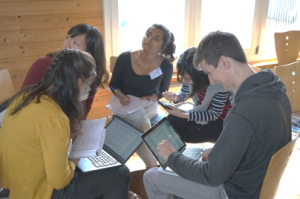
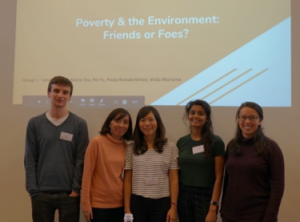
Since my research topic about food and poverty issue, therefore I did not find any difficulties to connected between summer school topic and my research. This kind of program allowed all participant to explore and share their knowledge with the opportunity to stimulate a new way approach to solve a problem and learn from each other. Even though the duration of this summer school is very limited, I could expand the horizon of my knowledge especially from the political point of view of environmental policies. Through this summer school, I had an opportunity to meet and connect with excellent students from different countries, intercultural experience, an opportunity to work with scholars from different disciplines and backgrounds. I would like to say that this kind of program will challenge us to be more confident in an international forum, actively speak up, and listen and respect to other people point of view. This experience provides us with a different perspective and gains new inspirations directly and indirectly to our research and career in the future. I hope in the upcoming event, more students from Tokyo Tech will actively join for this opportunity.
After the summer school finished, I spent some time to enjoy Zurich and any other city in Switzerland. At that time, I was be able to meet with Anna, former exchange student from ETH, she became a one-day “tour guide” for me in Zurich. I hope we will meet each other soon. Here some pictures when I visited Zurich, Bern, and Mount Pilatus.
